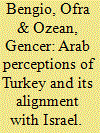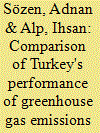|
|
|
Sort Order |
|
|
|
Items / Page
|
|
|
|
|
|
|
| Srl | Item |
| 1 |
ID:
047344


|
|
|
|
|
| Publication |
Ramat Gan, BESA Center for Strategic Studies, 2001.
|
| Description |
92p.
|
| Contents |
Reprinted with permission from Middle Eastern Studies, Vol. 37, No. 2
|
|
|
|
|
|
|
|
|
|
|
|
Copies: C:1/I:0,R:0,Q:0
Circulation
| Accession# | Call# | Current Location | Status | Policy | Location |
| 044801 | 355.03109561/BEN 044801 | Main | On Shelf | General | |
|
|
|
|
| 2 |
ID:
053964


|
|
|
|
|
| Publication |
Ramat Gan, BESA Center for Strategic Studies, 2001.
|
| Description |
92p.
|
| Series |
Mideast security and policy studies; no.48
|
| Contents |
Reprinted with permission form Middle Eastern Studies, Vol. 37, No.2
|
|
|
|
|
|
|
|
|
|
|
|
Copies: C:1/I:0,R:0,Q:0
Circulation
| Accession# | Call# | Current Location | Status | Policy | Location |
| 045155 | 355.03109561/BEN 045155 | Main | On Shelf | General | |
|
|
|
|
| 3 |
ID:
092726


|
|
|
|
|
| Publication |
2009.
|
| Summary/Abstract |
Turkey signed the Kyoto Protocol on February 17th, 2009. Therefore, to fulfill the liabilities of the Kyoto Protocol, she has to review her status and make strategic plans to hold the emissions at the levels specified in the protocol. For this purpose, in this study employing data envelopment analysis (DEA), Turkey's greenhouse gas (GHG) emissions and local/regional pollutants compared to the European Union (EU) countries have been put in place. Since the data on Malta and Cyprus was inadequate, these two nations were excluded from the evaluation. As a candidate for EU, Turkey is required to reduce the emissions by 8% until 2012 within the framework of the Kyoto Protocol.
Two models were considered in this performance work: (i) the first model for the input energy consumption, GHG and local/regional pollutants (total GHG, CO2, F (emissions of non-methane volatile organic compounds), CO, NO2, SO2) has been considered as the output value. (ii) In the second model, the values entered in the sectoral energy consumption have been considered as GHG emissions and local/regional pollutants output. Model 2 was taken into account in which different inputs were employed to observe the impacts of input values causing GHG emissions on emission. DEA technique is used, which holds the output constant in the direction which should reduce the input. For this purpose, the effect of sectoral energy consumption on total emission was identified and it was aimed to identify on which energy resources the strategy developed for emission reduction should be.
|
|
|
|
|
|
|
|
|
|
|
|
|
|
|
|
|
|
|
|
|